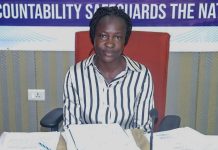Abdoulai G. Dibba
The Government of the Gambia through the Ministry of Finance and the Ministry of Energy, in collaboration with development partners such as the World Bank and African Development Bank, on Monday 13th November 2017, briefed the media on the electricity sector roadmap at the UN House in Cape Point.
In his introduction, the Minister of Finance Amadou Sanneh, stated that they had a joint team from the World and African Development Banks who met with President Adama Barrow to brief him on the road map for the energy sector and the plan for investment raised by development partners.
He said Government together with development partners, are coordinating efforts in taking this serious challenge that the country faces in the energy sector. “This new Government came into power and found generators that are almost on their knees and some of them almost fallen on their faces if I may say so,” Minister Sanneh asserted.
He said there were three or four broken down generators and this created serious power outages which has been acknowledged; that it is for the citizen of this country to realise that Government is taking this issue along with other challenges seriously. “We are working with development partners on a roadmap that was developed, approved and validated at Kairaba Beach Hotel by all the development partners and the Government and it has been approved by cabinet,” he said. Minister Sanneh concluded that they have plans to deal with the energy situation of this country as a whole and not just the Greater Banjul Area.
On his part, the Minister of Energy Fafa Sanyang indicated that the energy situation in the country is a perennial problem which is inherited by this Government but that they are ready to take the challenge. “That is why we assess the situation and come up with a roadmap in which we identified where we are and the way we can solve the problem,” he stated.
He said for 50 years or more, they have been firefighting the electricity problem in the country but that he thinks it ‘‘is right time now that we think and act to make sure that we attain an everlasting solution to the problem”.
Louise Cord, the World Bank Country Director for Senegal, Cape Verde, The Gambia, Guinea Bissau and Mauritania who is based in Senegal, informed the press that her institution is committed to partner with Government to address the energy problem in the country. She acknowledged that the electricity problem in October was serious because three generators got broken and spare parts to maintain them got delayed at a time when the demand for electricity was at its peak. She however said there is a roadmap for the medium and long term reforms that cost US$600 million worth of investment in the sector by both the public sector and the private sector.
This investment she stated involves connecting the Gambia to the West Africa Power Pool with the hydro energy source from Guinea.
She concluded that this connection involves new form of solar energy and solar energy with storage and the scaling up of the transmission and distribution lines not only around Banjul, but in other parts of the country as well.
“The donors are very keen in realizing the roadmap,” she asserted.
Other speakers at the press conference included Batch Baldeh of the African Development Bank and the Director General of NAWEC, Baba Fatajo, who highlighted their institution’s commitment to contribute to the arresting of the perennial electricity problem in the country.


















